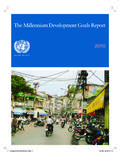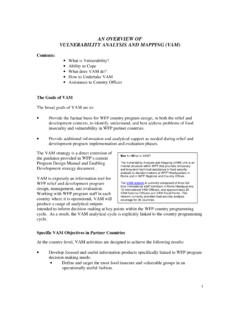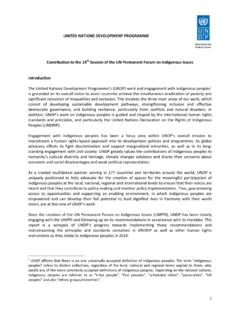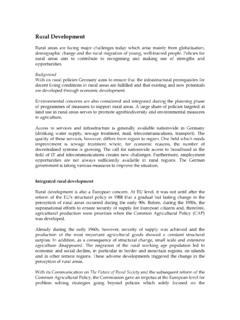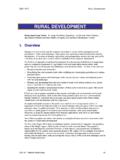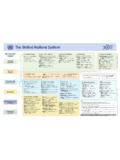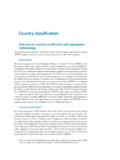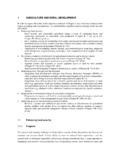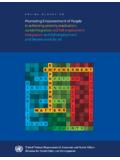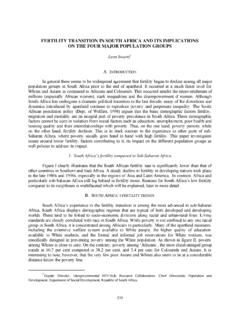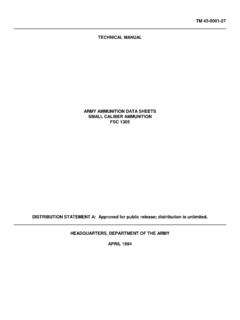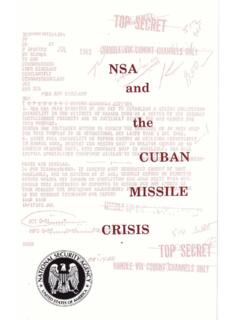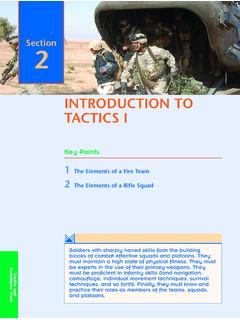Transcription of A/RES/55/2: United Nations Millennium Declaration
1 United NationsA/RES/55/2 General AssemblyDistr.: General18 September 2000 Fifty-fifth sessionAgenda item 60 (b)00 55951 Resolution adopted by the General Assembly[without reference to a Main Committee (A/55 )]55 Nations Millennium DeclarationThe General AssemblyAdopts the following Declaration : United Nations Millennium and , heads of State and Government, have gathered at United NationsHeadquarters in New York from 6 to 8 September 2000, at the dawn of a newmillennium, to reaffirm our faith in the Organization and its Charter asindispensable foundations of a more peaceful, prosperous and just recognize that, in addition to our separate responsibilities to our individualsocieties, we have a collective responsibility to uphold the principles of humandignity, equality and equity at the global level.
2 As leaders we have a dutytherefore to all the world s people, especially the most vulnerable and, inparticular, the children of the world, to whom the future reaffirm our commitment to the purposes and principles of the Charter ofthe United Nations , which have proved timeless and universal. Indeed, theirrelevance and capacity to inspire have increased, as Nations and peoples havebecome increasingly interconnected and are determined to establish a just and lasting peace all over the world inaccordance with the purposes and principles of the Charter. We rededicateourselves to support all efforts to uphold the sovereign equality of all States,respect for their territorial integrity and political independence, resolution ofdisputes by peaceful means and in conformity with the principles of justice andinternational law, the right to self-determination of peoples which remainunder colonial domination and foreign occupation, non-interference in theinternal affairs of States, respect for human rights and fundamental freedoms,respect for the equal rights of all without distinction as to race, sex, languageor religion and international cooperation in solving international problems ofan economic, social.
3 Cultural or humanitarian believe that the central challenge we face today is to ensure thatglobalization becomes a positive force for all the world s people. For whileglobalization offers great opportunities, at present its benefits are veryunevenly shared, while its costs are unevenly distributed. We recognize thatdeveloping countries and countries with economies in transition face specialdifficulties in responding to this central challenge. Thus, only through broadand sustained efforts to create a shared future, based upon our commonhumanity in all its diversity, can globalization be made fully inclusive andequitable. These efforts must include policies and measures, at the global level,which correspond to the needs of developing countries and economies intransition and are formulated and implemented with their consider certain fundamental values to be essential to internationalrelations in the twenty-first century.
4 These include: Freedom. Men and women have the right to live their lives and raise theirchildren in dignity, free from hunger and from the fear of violence, oppressionor injustice. Democratic and participatory governance based on the will of thepeople best assures these rights..Equality. No individual and no nation must be denied the opportunity tobenefit from development. The equal rights and opportunities of women andmen must be assured. Solidarity. Global challenges must be managed in a way that distributes thecosts and burdens fairly in accordance with basic principles of equity andsocial justice. Those who suffer or who benefit least deserve help from thosewho benefit most. Tolerance. Human beings must respect one other, in all their diversity ofbelief, culture and language.
5 Differences within and between societies shouldbe neither feared nor repressed, but cherished as a precious asset of culture of peace and dialogue among all civilizations should be activelypromoted. Respect for nature. Prudence must be shown in the management of all livingspecies and natural resources, in accordance with the precepts of sustainabledevelopment. Only in this way can the immeasurable riches provided to us bynature be preserved and passed on to our descendants. The currentunsustainable patterns of production and consumption must be changed in theinterest of our future welfare and that of our descendants. Shared responsibility. Responsibility for managing worldwide economic andsocial development, as well as threats to international peace and security, mustbe shared among the Nations of the world and should be exercisedmultilaterally.
6 As the most universal and most representative organization inthe world, the United Nations must play the central order to translate these shared values into actions, we have identified keyobjectives to which we assign special , security and will spare no effort to free our peoples from the scourge of war, whetherwithin or between States, which has claimed more than 5 million lives in theA/RES/55/23past decade. We will also seek to eliminate the dangers posed by weapons ofmass resolve therefore: To strengthen respect for the rule of law in international as in national affairsand, in particular, to ensure compliance by Member States with the decisionsof the International Court of Justice, in compliance with the Charter of theUnited Nations , in cases to which they are parties.
7 To make the United Nations more effective in maintaining peace and securityby giving it the resources and tools it needs for conflict prevention, peacefulresolution of disputes, peacekeeping, post-conflict peace-building andreconstruction. In this context, we take note of the report of the Panel onUnited Nations Peace Operations1 and request the General Assembly toconsider its recommendations expeditiously. To strengthen cooperation between the United Nations and regionalorganizations, in accordance with the provisions of Chapter VIII of theCharter. To ensure the implementation, by States Parties, of treaties in areas such asarms control and disarmament and of international humanitarian law andhuman rights law, and call upon all States to consider signing and ratifying theRome Statute of the International Criminal To take concerted action against international terrorism, and to accede as soonas possible to all the relevant international conventions.
8 To redouble our efforts to implement our commitment to counter the worlddrug problem. To intensify our efforts to fight transnational crime in all its dimensions,including trafficking as well as smuggling in human beings and moneylaundering. To minimize the adverse effects of United Nations economic sanctions oninnocent populations, to subject such sanctions regimes to regular reviews andto eliminate the adverse effects of sanctions on third parties. To strive for the elimination of weapons of mass destruction, particularlynuclear weapons , and to keep all options open for achieving this aim, includingthe possibility of convening an international conference to identify ways ofeliminating nuclear dangers. To take concerted action to end illicit traffic in small arms and light weapons ,especially by making arms transfers more transparent and supporting regionaldisarmament measures, taking account of all the recommendations of theforthcoming United Nations Conference on Illicit Trade in small arms andLight weapons .
9 To call on all States to consider acceding to the Convention on the Prohibitionof the Use, Stockpiling, Production and Transfer of Anti-personnel Mines and 1 A/55/305-S/2000/809; see Official Records of the Security Council, Fifty-fifth Year, Supplement for July,August and September 2000, document S/2000 Their Destruction,3 as well as the amended mines protocol to theConvention on conventional urge Member States to observe the Olympic Truce, individually andcollectively, now and in the future, and to support the International OlympicCommittee in its efforts to promote peace and human understanding throughsport and the Olympic Development and poverty will spare no effort to free our fellow men, women and children from theabject and dehumanizing conditions of extreme poverty, to which more than abillion of them are currently subjected.
10 We are committed to making the rightto development a reality for everyone and to freeing the entire human racefrom resolve therefore to create an environment at the national and globallevels alike which is conducive to development and to the elimination in meeting these objectives depends, inter alia, on good governancewithin each country. It also depends on good governance at the internationallevel and on transparency in the financial, monetary and trading systems. Weare committed to an open, equitable, rule-based, predictable and non-discriminatory multilateral trading and financial are concerned about the obstacles developing countries face in mobilizingthe resources needed to finance their sustained development.
